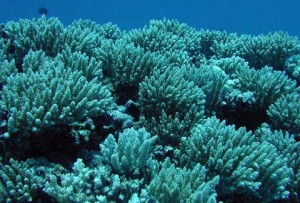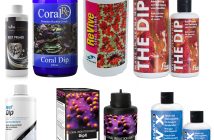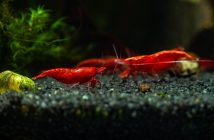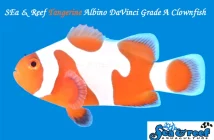Back in October 2009, the Center for Biological Diversity created a petition to list 83 coral species as threatened or endangered. In response to that petition, the National Marine Fisheries Service (NMFS), the National Oceanic and Atmospheric Administration (NOAA), and the Department of Commerce have opened a 90-day finding period seeking information on whether the 83 coral species would be given protection under the ESA (see findings below).
In addition to listing the corals, the petition by the Center for Biological Diversity stated that threats of ocean warming, ocean acidification, dredging, coastal development, coastal point source pollution, agricultural and land use practices, disease, predation, reef fishing, aquarium trade, physical damage from boats and anchors, marine debris, and aquatic invasive species all negatively impact the 83 listed species of corals. Also indicated on the petition, 76 of the coral species were considered vulnerable, with six being endangered, and one critically endangered.
Our hobby and lifestyles directly impact wild reefs. We harvest thousands of corals, fish, and invertebrates every day from the ocean. Additionally, we destroy hundreds of acres of wild reefs each day through land-based agriculture, pollution, global warming, ocean acidification, and various other human activities. The aquarium hobby isn’t the primary source of this death and destruction, but we certainly don’t help matters. The aquarium industry is a billion dollar industry. Hundreds of thousands, if not millions, of fish and corals are sold annually, and most of those don’t live past a few years in the home aquarium…assuming they even make it to the home aquarium alive. Inexperienced hobbyists frequently purchase fish and corals they cannot care for and shipping causes countless losses.
I hate to preach about gloom and doom, but unless we change the way things are, we won’t have a hobby to enjoy. We need to be responsible hobbyists and purchase only aquacultured (or even maricultured) livestock. Advances in fish breeding and coral propagation are occurring every day, with new aquacultured species readily available. Corals are easy to propagate, so there’s really no excuse to buy wild colonies. But again, the hobby isn’t the only culprit.
Below is a copy of the findings by the NMFS, NOAA, and the Department of Commerce:
National Marine Fisheries Service Sets Deadline for Public and Expert Input on Petition to List 82 Stony Coral Species Under the Endangered Species Act.
From the Federal Register (Vol. 75, No. 27 / Wednesday, February 10, 2010)
Endangered and Threatened Wildlife; Notice of 90–Day Finding on a Petition to List 83 Species of Corals as Threatened or Endangered Under the Endangered Species Act (ESA)
AGENCY: National Marine Fisheries Service (NMFS), National Oceanic and Atmospheric Administration (NOAA), Department of Commerce.
ACTION: 90–day petition finding; request for information.
SUMMARY: We (NMFS) announce a 90– day finding on a petition to list 83 species of corals as threatened or endangered under the ESA. We find that the petition presents substantial scientific or commercial information indicating that the petitioned actions may be warranted for 82 species; we find that the petition fails to present substantial scientific or commercial information indicating that the petitioned action may be warranted for Oculina varicosa. Therefore, we initiate status reviews of 82 species of corals to determine if listing under the ESA is warranted. To ensure these status reviews are comprehensive, we solicit scientific and commercial information regarding these coral species.
DATES: Information and comments must be submitted to NMFS by April 12, 2010.
The 83 species included in the petition are: Acanthastrea brevis, Acanthastrea hemprichii, Acanthastrea ishigakiensis, Acanthastrea regularis, Acropora aculeus, Acropora acuminate, Acropora aspera, Acropora dendrum, Acropora donei, Acropora globiceps, Acropora horrida, Acropora jacquelineae, Acropora listeri, Acropora lokani, Acropora microclados, Acropora palmerae, Acropora paniculata, Acropora pharaonis, Acropora polystoma, Acropora retusa, Acropora rudis, Acropora speciosa, Acropora striata, Acropora tenella, Acropora vaughani, Acropora verweyi, Agaricia lamarcki, Alveopora allingi, Alveopora fenestrate, Alveopora verrilliana, Anacropora puertogalerae, Anacropora spinosa, Astreopora cucullata, Barabattoia laddi, Caulastrea echinulata, Cyphastrea agassizi, Cyphastrea ocellina, Dendrogyra cylindrus, Dichocoenia stokesii, Euphyllia cristata, Euphyllia paraancora (ed: sic), Euphyllia paradivisa, Galaxea astreata, Heliopora coerulea, Isopora crateriformis, Isopora cuneata, Leptoseris incrustans, Leptoseris yabei, Millepora foveolata, Millepora tuberosa, Montastraea annularis, Montastraea faveolata, Montastraea franksi, Montipora angulata, Montipora australiensis, Montipora calcarea, Montipora caliculata, Montipora dilatata, Montipora flabellata, Montipora lobulata, Montipora patula, Mycetophyllia ferox, Oculina varicosa, Pachyseris rugosa, Pavona bipartite, Pavona cactus, Pavona decussate, Pavona diffluens, Pavona venosa, Pectinia alcicornis, Physogyra lichtensteini, Pocillopora danae, Pocillopora elegans, Porites horizontalata, Porites napopora, Porites nigrescens, Porites pukoensis, Psammocora stellata, Seriatopora aculeata, Turbinaria mesenterina, Turbinaria peltata, Turbinaria reniformis, and Turbinaria stellula. Eight of the petitioned species are in the Caribbean and belong to the following families: Agaricidae (1); Faviidae (3); Meandrinidae (2); Mussidae (1); Oculinidae (1).
The petition states that all of these species are classified as vulnerable (76 species), endangered (six species: Acropora rudis, Anacropora spinosa, Montipora dilatata, Montastraea annularis, M. faveolata, Millepora tuberosa), or critically endangered (one species: Porites pukoensis) by the World Conservation Union (IUCN). Montipora dilatata and Oculina varicosa are also on our Species of Concern list.







Pingback: Should Aquarium Ownership Require a License | AquaNerd()